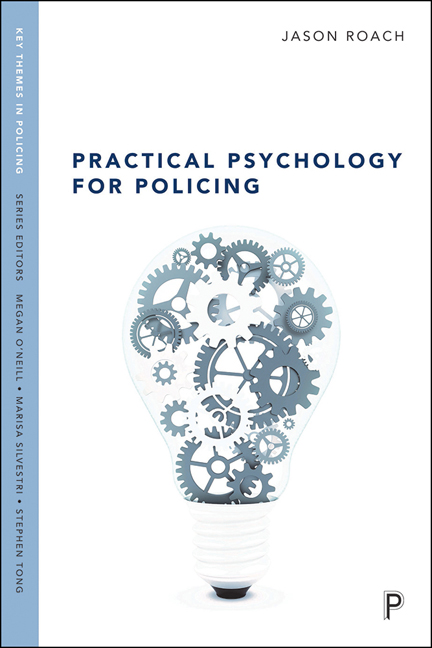Book contents
- Frontmatter
- Dedication
- Contents
- Series preface
- List of figures, tables, and boxes
- Acknowledgements
- 1 Introduction (or unleashing the kraken)
- 2 Psychology and policing: welcome bedfellows?
- 3 Human and police decision-making
- 4 Challenging common police perceptions of career criminals and serious offenders
- 5 Self-Selection Policing
- 6 Psychology, expertise, and improving police officer street-craft
- 7 Psychology and crime prevention
- 8 Psychology and police wellbeing
- 9 Psychology and policing: taking stock and where do we go from here?
- Notes
- References
- Index
1 - Introduction (or unleashing the kraken)
Published online by Cambridge University Press: 17 January 2024
- Frontmatter
- Dedication
- Contents
- Series preface
- List of figures, tables, and boxes
- Acknowledgements
- 1 Introduction (or unleashing the kraken)
- 2 Psychology and policing: welcome bedfellows?
- 3 Human and police decision-making
- 4 Challenging common police perceptions of career criminals and serious offenders
- 5 Self-Selection Policing
- 6 Psychology, expertise, and improving police officer street-craft
- 7 Psychology and crime prevention
- 8 Psychology and police wellbeing
- 9 Psychology and policing: taking stock and where do we go from here?
- Notes
- References
- Index
Summary
Let us be clear from the start. I am not, nor ever have been, a police officer or indeed even been directly employed by any police service. This book therefore neither comprises a collection of war stories from experiences on the front line, nor provides a prescriptive list of how officers should behave in certain situations. It does, however, bring applied research which I (and colleagues) have conducted in crime and policing over the past two decades, into one convenient book.
I hope that this book will not be perceived as having been written by a patronising academic, as that really was not my intention. In fact, any egg-sucking caused (to grannies or anyone else) by reading this book, was completely unintended and please accept my sincere apologies if it comes across so.
If the often trotted-out opinion that it takes five years for a police officer to acquire the knowledge and experience needed to be a police officer (provenance unknown) rings true in any way, this book will hopefully make a contribution to the expediting of both, by presenting practical examples of how a little psychological knowledge and research can be applied in policing.
Although this book was principally written with those new to policing in mind, both newly ‘sworn’ ‘front-line’ police officers and police staff (such as those working in prevention or supporting criminal investigations), more ‘experienced’ readers or those familiar with academic research in this area will hopefully also take some learning or ideas from it.
This book represents my take on how an introduction to how some psychological research and theory can be used to inform various policing tasks (and vice-versa). The first aim is to demonstrate how a little knowledge of psychology can be used in the understanding and practice of policing; namely, its application for the policing tasks of crime prevention, street patrols, and criminal investigation. Although the psychological research drawn on here and applied to such policing tasks is arguably limited, one hopes that this book in some way will act as a catalyst for the production of further books focusing on how psychology can be used in other aspects of policing, such as cybercrime and counter-terrorism policing.
- Type
- Chapter
- Information
- Practical Psychology for Policing , pp. 1 - 9Publisher: Bristol University PressPrint publication year: 2023

